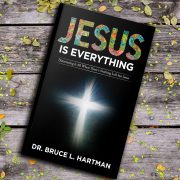And now these three remain: Faith, Hope, and Love. But the greatest of these is Love.
1st Corinthians [13:13]
Within Catholic theology, there are three theological virtues; Faith, Hope, and Love. These virtues are considered divine and are gifts freely bestowed upon all of us through the grace of God. I recently discussed these three virtues with a Catholic friend and their impact on our perspective on life. He informed me that for Catholics, these three are holy virtues. Thus, sending me to research how and why these three virtues are considered sacred.
As a Methodist most of my adult life, this might seem odd to my fellow Methodists to study Catholicism. However, It really isn’t; as Methodists, one of our fundamental tenets is to explore God all we can. So with that thought in mind, I wanted to learn more.
It seems that Thomas Aquinas developed this thought, using 1 Corinthians [13:13], where it says, And now these three remain: Faith, Hope, and Love. But the greatest of these is Love. Aquinas explains that these three theological virtues are infused in us by God. Further, we come to know these virtues through our interactions with God. In effect, our choice to activate these virtues puts us in concert with God.
It seems to me that a life without Faith, Hope, and Love would be a dark and dreary existence. A life of depression without any sunrise on the horizon and the absence of Jesus. Yet, I know people who lead this life. They are not entirely devoid of these three qualities; instead, they tend to see darkness and not light. For some, this perspective is a habit. For others, it was caused by an underlying set of events that causes sustained grief. And even sometimes caused by their environment.
While not all causes of leading a dreary life can be remedied without outside help, most can. Simply choosing to redirect our thinking to Jesus and these God-given virtues will fix and help our perspective on life.
For instance, Faith is belief in the unseen. We completely surrender ourselves to following Jesus, even when it’s not explicitly apparent our faith will help. A mindset of not being overly pragmatic about outcomes and changing our perspective from knowing tangibly and precisely what the future holds to being reassured that somehow Jesus is involved.
Hope is simply knowing good will occur because Jesus exists in our lives. The opposite of Hope is despair. A state where nothing seems to go right. Like Faith, Hope is also a matter of perspective. We can choose to follow the course of hopelessness or believe the valley we are in will eventually end. Many times difficult trials are periods of divine preparation. A time of our growing and becoming prepared for our next challenge. The more we meet these challenges, the greater our growth. In turn, we don’t see the valleys of life despondently but as opportunities to rise up through a hopeful perspective.
The Apostle Paul declares the greatest of the three virtues is Love. Love is a choice we make, and all have the capacity to love through the grace of God. When we do things without Love, we miss opportunities to lift up other people. Our acts, while honorable, have less value. Love is an act of giving without the desire for a reward: a conscious act to desire a benefit for the other person. Any action done with love is aligned with Jesus.
Perspective is a matter of our free will. We all can choose to embrace, Faith, Hope, and Love. When we do, we open our hearts to Jesus and activate these three gifts from God. Instead of thorns, we will see roses. Life will become lighter. For some, this is a mighty challenge because of life circumstances. But for most of us, it is simply a matter of redirecting our thoughts to see good and trust Jesus.
Love your neighbor as yourself
Matthew [22:39]
In an age where pronouns are hotly debated and discussed, the pronoun WE seldom comes up. Yet in our lives and especially our business lives, WE is most important. Almost everything we do in business and life is related to combining our efforts with someone else, whether a customer, friend, co-worker, subordinate, or supervisor.
Every effort in these exchanges requires a sense of goodwill towards those with whom we work. Goodwill towards the other person we associate with is a vital part of being successful. However, goodwill is also a surrendering of our individual needs to a team effort of accomplishment—surrendering what we want to a combined effort of collaboration of team goals.
While we may accomplish something by ourselves or dictate the actions to someone else, our efforts will always be less without the genuine commitment from and to those with whom we work.
I have a friend with whom I work, named Bill, who consistently demonstrates this attitude. When we work together, he is very concerned about doing his part. For example, recently, we collaborated on editing and preparing my next book. Bill was apprehensive about making sure he knew my deadlines and what his requirements were.
As I laid out our goals, Bill added action steps that would make a better product. Not pushy or insistent, constantly probing to look for a better way. When Bill was sure he had the project understood and the timelines right, he agreed to proceed. I knew he would hit his timeline from working with Bill in the past, and the results would be far better than I expected.
Bill called a few days before the deadline and asked if we were still on track to meet to discuss his work. The day before our meeting, Bill sent me his work to review. When I reviewed the material Bill sent, I was elated. Not only had he achieved what was expected, but many other things were also added that made the project so much better than if I had done the work myself. I remember sitting at my desk, amazed at what Bill had done.
Later, when we met, Bill laid out how he accomplished his task. Telling me, he had found a person who was better than him at consolidating words, which made the book more concise and readable. He relayed how he had spent a few nights checking references and citations to make sure they were accurate. A process typically done when the project was completed. In our conversation, I could actually feel his total commitment to living up to his personal standards.
Bill had complied with all the standards required by the pronoun WE. Working with Bill is always refreshing because he adds value and makes projects far better than what I usually envisioned. Bill’s commitment to WE inspires me to do the same with him. His commitment to WE sets a standard for whom and how I work with other people.
Bill is a very committed Christian, and long ago, he surrendered to Jesus. Knowing all that he accomplished was through the grace of Christ. In turn, this surrendering moved himself from I to WE. And there are few Bible verses more important to Bill than love your neighbor as thyself. In all of Bill’s work and our relationship, he exhibits this trait.
Bill lives this commandment not only as his duty but through his heart. We all know these people in our lives. When something needs to get done, they are always early in showing up. They add value in surprising ways. They surrender their needs for the overall good, and their reward is only with a job well done.
It seems to me, we need more Bill’s in our business and personal lives. In a time of discussion about pronouns and which are best, I think we would all be better at what we do if We were our first thought. Try it out with your next engagement and watch the results become better than what we thought.
A Final Message About “Fully” Accepting Jesus
From that time Jesus began to show His disciples that He must go to Jerusalem, and suffer many things from the elders and chief priests and scribes, and be killed, and be raised up on the third day.
Matthew [16:21]
Today is the final installment in our series, Jesus Is Everything. As I sat watching the Two Popes movie, I was both inspired by the movie and compelled to know more about Pope Francis. In my research, I discovered lots of interesting information. Mostly inspiring and good, and like all of us, Pope Francis has a few skeletons.
He has a number of first’s to his credit; the first Jesuit Pope, the first Pope from South America, the first non-European Pope since the 8th century, the first Pope to speak to the joint session of Congress, the first Pope not to live in the Papal apartments and the first Pope to preach in front of one million people in the United States. He is a populist Pope who is heavily indoctrinated in pastoral theology.
Pope Francis is both very smart and personable, which allowed him to rise quickly in the Jesuit ranks. He became a Cardinal in 2001 and quickly became admired by the other cardinals. In fact, after the death of John Paul the second in 2005, after only being a Cardinal for four years, was the runner-up in choosing the New Pope. A remarkable ascent.
He became the Pope in 2013 after Pope Benedict resigned due to murky controversies. As the Cardinals were meeting to discuss the next Pope, a fellow Cardinal went up to Pope Francis and said; Don’t forget the poor. After his election, Pope Francis remembered this advice and believing it was a message of providence, selected the name Francis, after Saint Francis. His reasoning as he states; Saint Francis was a man who gives us this spirit of peace, the poor man.
Pope Francis grew up in a middle-class family in Argentina. Prior to becoming the Pope his name was Jorge Mario Bergoglio. He had a fairly normal childhood and was reasonably educated. At first, he was a chemist prior to entering the Jesuit Seminary. He is an avid soccer fan and loves to Tango. He had a couple of romantic interests as a young adult and almost was engaged. He was always torn between following the priesthood or leading a secular life. A confusion that delayed his ordination as a priest until the age of thirty-one. In fact, he told one girlfriend, If I don’t become a priest, I would want to be married to you.
Pope Francis is not without controversy. Early in his ministry and as a leader of the Jesuit Society of Argentina, Francis was criticized for not doing more to stand up to the military Junta that terrorized Argentina in the late 1970s. He has not denounced gay marriage, which has led the conservative faction of the church to complain. His response; If a person is gay and seeks God and has goodwill, who am I to judge? Many have also suggested that Pope Francis has been slow in dealing with the Catholic child abuse scandal. For a time, even the Jesuit society was critical, because he was too pastoral and concerned with religiosity, versus social Justice.
At his center, Francis is a humble man and remains committed to helping people, especially the poor. He avoids the material trappings of being a Pope. In fact, he still wears his Iron cross from his time as a bishop. He leans more to mercy than judgment, which we find in one of his more famous quotes; A little bit of mercy makes the world less cold and more just.
Certainly, all this is nice to know and gives us color into the life of Pope Francis. In my research, I wanted to discover more, like how did he find and fully accept Jesus. A friend of mine, Tom Stanton, once told me, You have to fully embrace Jesus to fully experience Jesus. A well-intentioned comment that has made me think over the last year, what did Tom mean by fully and how does one arrive at this point? As my year has preceded, I have turned this thought, Fully, over and over in my mind. As I was doing my research on Pope Francis, I discovered what Tom was talking about when he said, fully.
Pope Francis has a three-step process to fully accepting Jesus, the first two are easy. First, we must find Jesus. Doing things like reading the Bible, going to church, or attending a Bible study. In this step, we are both compelled and desirous of finding Jesus. The second step is our outward proclamation; which includes, wearing crosses, leaving Bibles on our desk, singing in church, or speak openly about Jesus. In this step, we are not embarrassed or afraid to say what we know about Jesus.
The third and final step is where the word, fully comes into play. Pope Francis says we must fully believe in the resurrection of Jesus, to fully accept Jesus. While the first two steps are easy to absorb, this third step is the biggest hurdle in our journey to fully knowing Jesus. It involves believing Jesus’ sacrificial act on the cross gives all humankind redemption. We must both understand the importance of the cross and the sacredness of the gift Jesus has given us. When we do, it moves us from seeing our lives as permanently residing in this world to seeing our lives as an eternal pursuit of the divine. In this moment of belief, we no longer intellectualize the cross, but fully have faith in Jesus’ act on the cross. With this faith, we become both freed and redeemed. The movements of this world take on far less meaning and our worries subside. Both our inner and outer expressions transform into loving God and our neighbor.
For Pope Francis, our fully accepting Jesus happens with the help of the Holy Spirit. A calling out to the Spirit to both change us and guide us. I have long held that this part of the journey is very unique, different from individual to individual. When completed, we no longer have a foot in two worlds. We are no longer Catholics or Methodists, we are first Christians. Pope Francis describes this attitude as follows; The Lord has redeemed all of us, all of us, with the blood of Christ: all of us, not just Catholics. Everyone! ‘Father, the atheists?’ Even the atheists. Everyone!
This journey to fully believing in Jesus is different for every person. And for each individual there will be moments of remorse when we fail to live what we have fully accepted; and moments of joy when we live what we have fully accepted. Fully accepting Jesus; can take the time or happen in an instant, but should be constantly pursued.
I hope and pray for all those on this journey of faith, that this helps in some way.
For my readers over the last three years, this is my last regular posting of a blog for a while. My fourth book is underway and will require my full attention until it is published on March 31st. Until then, be at peace and enjoy the blessings of Jesus.
Blessings, until next time,
Bruce L. Hartman
Photo by Jake Blucker on Unsplash
A Woman Alone On A Bench
For God so loved the world that he gave his one and only Son, that whoever believes in him shall not perish but have eternal life. -John [3:16]
Today, we continue with our four-part series called, Jesus is everything. Our story today is about a young woman from Panama, who considered ending her life. At the darkest moment of her life, she found God’s and her friend’s love.
Karina sat alone on a bench on the campus of Panama National University. Her eyes were covered with sunglasses hiding her red and swollen eyes. The pressure of her life and sense of abandonment had finally overwhelmed her ability to cope. She sat there with suicidal thoughts, she no longer thought anyone cared. At this moment she felt utterly alone.
Karina had been adopted by a couple who couldn’t have children. Soon after her adopted parents started a restaurant, which quickly became so busy they had little time for her. They hired a nanny and for many hours of the day and night, the nanny was the only person Karina saw. Over time her nanny became her surrogate mother. As her parent’s business continued to grow, Karina’s sense of abandonment grew.
When she first entered college, life got much harder. Both of her adopted parents became chronically ill. Making her the head of a household almost overnight. A life that was already hard, became harder. It was too much for her to handle alone.
In her earlier years she wrestled with; why does everyone abandon me? She wondered why her birth parents gave her up and why her adopted parents spent little time with her. The added pressure of being in college and the head of a dysfunctional household brought her to the point of sitting alone on a quiet bench. Even though she was surrounded by people, she sat feeling entirely alone. A desperate person, who had lost the ability to lift her head up and smile.
Two of her friends came by the bench Karina where she was sitting, Daniela and Zoar, and noticed her grief. Then without thinking, all of Karina’s poisonous thoughts poured out. All that she had been holding in for many years, came out through tears. Her emotional dam had broken and all she could do was spin in her mind over and over, why me.
Her friends listened and consoled. Holding her hands they quoted John [3:16]; For God so loved the world that he gave his one and only Son, that whoever believes in him shall not perish but have eternal life. They told her about the four spiritual laws, one of which says; We must individually receive Jesus Christ as Savior and Lord; then we can know and experience God’s love and plan for our lives.
And there it was, a desperate young woman looking for a way out of the hole of discouragement, had a plan. Because of her bareness, the verse and her friends created an overwhelming desire in her to seek to know more. Over the next few months, she absorbed all she could about Jesus and the Bible. Instead of looking at why me, she focused on how to find meaning through Jesus.
Karina, turned her tears to hope. Relief set in, because she was finding answers. She knew Jesus had heard her crying out. She was no longer alone. Things quickly changed in her life, not because her situation changed, but because she knew she was loved, by her friends and Jesus.
This is a familiar story about how crisis puts us at a crossroad in life. A place where we can choose which path to take. We can choose the path of why I or the path of hope. This crisis for a search for meaning and a sense of being loved is common. Most of us will or have experienced the same thoughts as Karina. If not, we are either very lucky and well-adjusted or overdue.
We can pour through the thousands of self-help books that show up on Amazon or in book stores. While helpful, not always on the mark. For Karina, it was her entry into the New Testament that lifted her out of her dungeon of despair. For others, it is the resistance of the pursuit of Jesus. An intellectual exercise in trying to rationalize if Jesus is real. C.S. Lewis rationalized for many years, before finally relenting in a dark corner of a library, describing himself as; the most reluctant and desperate of all converts. Each encounter of faith is very similar, a change is needed. While the individual’s journey to the crossroad of crisis is always unique.
At this crossroads, where most will stand at some point, a choice has to be made. Sometimes, so desperate, no other path exists, but the path to Jesus. Other times a desperate prayer had been answered and recognized as so personal, it must be Jesus. Still, other times, the long-awaited encounter with Jesus which has been long ignored, reappears at a time of utter hopelessness.
For Karina, it took friends to show her the path. In her reflection back to that very dark moment, she says; The Lord heard my cry. I’m not alone, and He loves me because He sent His only Son to pay for my sins. He dried my tears, and He continues picking me up when I fall. She had found Jesus and Jesus became her everything.
Life didn’t get easier for Karina after her crisis has passed. What got easier was her ability to cope. Driven by the knowledge that she did have friends that loved her and Jesus had heard her cry. She still had two very ill parents, school to complete, and a business to watch. In this painful journey, she learned she wasn’t abandoned. She found Jesus and she gave Him her life.
Blessings, until next time,
Bruce L. Hartman
Photo by Sage Friedman on Unsplash
The Eyes of Our Heart Gives Us Hope and Optimism
I ask that the eyes of your heart may be opened, so that you may know the hope of His calling, the riches of His glorious inheritance in the saints, and the surpassing greatness of His power to us who believe….”
Ephesians [1:18]-19
Opening the eyes of our hearts may seem to be an odd statement to some. However, when we choose to search for goodness and blessings: our lives become richer and fuller. We are able to weather the momentary squalls and move forward knowing we are supported by God.
When we recognize the Divine eyes of our hearts, we see so much of the richness that is right in front of us. And sometimes I have to remind myself that those eyes can get heavy and begin to close. When that happens we tend to fall into a funk and miss the joy that is all around.
God is giving us a beautiful landscape of life to observe and participate in. Let’s all open our eyes and take it all in!
Praying for God’s vision in your hearts!
Pastor Lou Strugala
Photo by Steve Halama on Unsplash
An Illiterate Southern Baptist Preacher; To Whom Jesus Was Everything.
In everything, therefore, treat people the same way you want them to treat you, for this is the Law and the Prophets.
Matthew [7:12]
Last week we began our four-part series called Jesus Is Our Everything. Today we continue this series with a story about an illiterate preacher. An everyday person, who followed Jesus to the pulpit, to run a successful racially mixed small church in the deep south.
One of my favorite preachers I use to give me inspiration is Clarence Jordan. Clarence was the inspirational founder of Habit for Humanity. He was the father of Hamilton Jordan, who was Jimmy Carter’s chief of staff. Clarence was a pioneer in social justice in the mid-20th century, at a time when our country was deeply divided racially. His main message was to bring Jesus’s words to life with action and not rhetoric. A peace-seeking man, who in every way lived this life. One of his formative learning moments occurred when he visited and preached at a Southern Baptist church in the deep south.
The church, Clarence visited and asked to preach at, was in a suburb near a large southern town. Clarence was positive that the church contained affluent white people who spoke the gospel, but did not live the gospel. As such, Clarence prepared a sermon for the church that would be hard hitting to teach them a lesson.
When he arrived at the church he found quite the opposite of his preconceived notion. He was amazed that a church that only had seating for three hundred, held six hundred. Not only that, both the black and white parishioners sat amongst each other. Seeing this he was startled and immediately knew he had to change his sermon on the fly.
When he was done preaching that Sunday, the church’s preacher asked him to stay and eat Sunday dinner with the parishioners. Once again, Clarence had an assumption that would be proven wrong. He assumed that the dinner would be held away from the main street and in the back of the church, where the local townspeople would not be able to see the diners. He also thought the parishioners would eat divided along racial lines. Instead, they ate together on the lawn in front of the church, where everyone in town could see. Quite remarkable in the mid-20th century of the deep south.
After the dinner, Clarence was compelled to discover more, asking the preacher to tell his story of how he achieved this unusual racial harmony. The humble preacher told Clarence his life story.
He revealed to Clarence that he had worked in the local mills before he became the church’s preacher. He also had never learned to read or write before he started preaching. He was just an ordinary person struggling to make a life with little resources. One Sunday he attended this church and became moved to learn more about the Bible and Jesus. At first, his friends read him the Bible and over time he learned the lessons of the Gospel. He also learned how to read and write. When the previous preacher left the church and there was no one to lead the Sunday service, he volunteered. Being the only one to volunteer, the church deacons said okay.
His first sermon was a hard-hitting message about loving all people. Not to look at the color of their skin, but to look at all people as equals. After delivering the sermon, a group of Deacons approached him and asked him not to preach that message again. Then the preacher did something very unusual, he told the deacons he would continue to preach this universal message of equality. He was a volunteer and they held no power over him. Some of the deacons left the church and others stayed. For a while he still had trouble, but as he said to Clarence; I preached awfully hard and I finally convinced all the members they were giving their lives to Jesus. And they were to be serious about it. What you see here today is a result of that.
And it wasn’t just that the white attendees understood this message. It was also that the black attendees understood. Everyone had to change their view of each other. One common thread was to view each other as neighbors and to love each other. The other important message was; Jesus was the only source of the truth, not the existing societal norm.
The reason this preaching style worked was the preacher’s insistence that they not only know the words of the Gospel but to also be serious about living the Gospel. He helped them see Jesus as their only guiding light.
This simple man with no education and limited worldly experience transformed a church by making Jesus the center point and everything to the parishioners. He faithfully resisted the societal norms of the day and stuck to his message. A simple message; in all that we do, we do for Jesus. Through his firm and resolute weekly messages, he eroded the built-up plaque of historical social divides and taught that all people are equally the people of God.
Clarence observed that the preacher had an important advantage in his task. He wasn’t educated at a university, where his faith could have tempered. He didn’t learn to read until after he found Jesus. He was pure and unaffected by those who could have steered him off course. Allowing him to stay completely focused on Jesus.
As a preacher, Jesus was his everything. He knew little about human theories and doctrine. He only knew a lot about Jesus. In this simple man, Clarence saw a purity of purpose untarnished by human thought. A person free from the lure of the world, who had nothing but Jesus. A message Clarence took with him on a day he thought he would be the teacher. A message that making Jesus everything, was the true course of his life.
Blessings, until next time,
Bruce L. Hartman
Photo by Stephen Radford on Unsplash
Get the FREE "Jesus Is Good For Business" Webinar plus new devotionals each month
Categories
- A Year With God
- Advice
- Business Leaders
- Business Morals
- Challenges
- Christian Ethics
- Christian Leadership
- Effective Delegation
- Friends
- Honesty
- How to be a great employee
- How to Build Your Reputation
- Inspiration
- Jesus and Business
- Jesus and Leadership
- Leadership
- Marketplace Ethics
- Plannning
- Prayer
- Psalms
- Religion and Business
- Successful Christians
- Uncategorized
- Work Ethic









